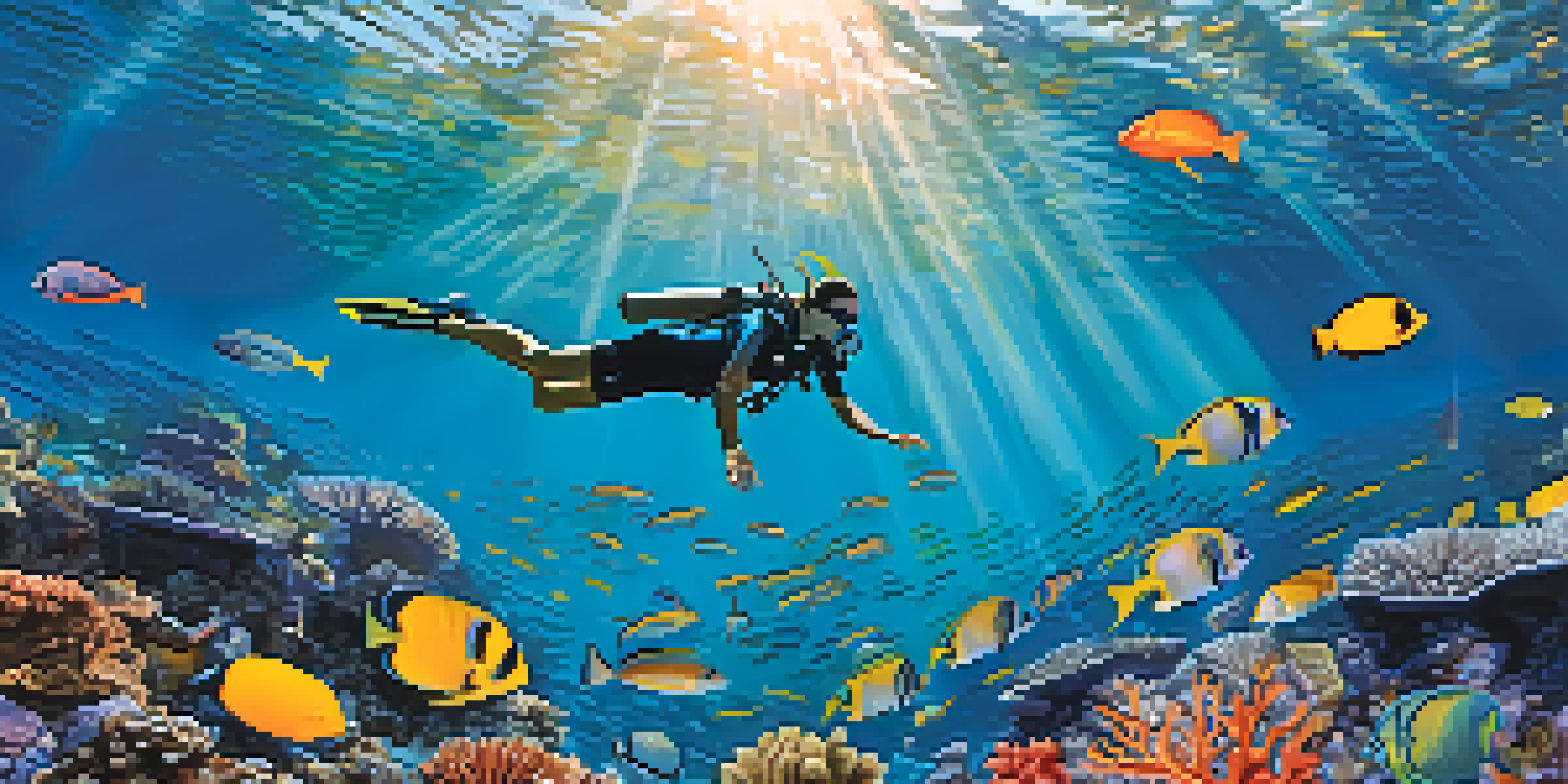Scuba Diving Travel Tips: Making the Most of Your Trip

Choose the Right Destination for Your Dive
Selecting the perfect scuba diving destination is crucial for an unforgettable experience. Whether you dream of exploring vibrant coral reefs in the Caribbean or diving alongside majestic manta rays in the Pacific, each location offers unique underwater wonders. Researching the best times to visit can also enhance your chances of witnessing spectacular marine life.
The ocean stirs the heart, inspires the imagination, and brings eternal joy to the soul.
Consider your skill level when choosing a destination. Some sites are ideal for beginners, while others challenge advanced divers with strong currents and complex underwater topography. Always match your diving experience with the site’s conditions to ensure a safe and enjoyable adventure.
Don’t forget to check for local diving regulations and environmental conservation efforts. Being aware of these factors not only enhances your experience but also helps protect the delicate ecosystems you’ll encounter.
Pack Smart: Essential Gear for Diving Trips
Packing the right gear can make all the difference in your diving experience. While many dive shops provide equipment, bringing your own mask, snorkel, and fins can ensure a better fit and comfort. Plus, having your gear means you’re always ready for an impromptu dive.

Remember to also pack a wetsuit or drysuit depending on the water temperature at your destination. Even in tropical waters, thermoclines can change quickly, and being prepared keeps you warm and comfortable. Additionally, don’t forget to include a dive computer or dive watch to monitor your time and depth underwater.
Choose the Right Dive Location
Selecting a destination that matches your skill level and interests is essential for an enjoyable diving experience.
Lastly, consider including safety items like a first-aid kit and a surface marker buoy. These tools can be invaluable in emergencies and contribute to a safe diving experience.
Stay Healthy: Pre-Dive Preparations
Prioritizing your health before diving is key to enjoying your underwater adventure. Hydration is vital—drink plenty of water leading up to your dive to avoid dehydration, which can affect your buoyancy and overall performance. Additionally, avoid heavy meals and alcohol the day before diving to ensure your body is in peak condition.
To be a good diver, you must be a good observer.
Consider undergoing a medical evaluation if you have any existing health concerns. Diving can put stress on your body, so it’s wise to confirm that you’re fit to dive, especially if you're planning multiple dives or working at higher altitudes.
Finally, ensure you get enough rest prior to your dive. Fatigue can impair your judgment and reaction times, which are critical when exploring the underwater world.
Dive with a Buddy: The Importance of Safety
Diving with a buddy is one of the most fundamental safety rules in scuba diving. Not only does it enhance safety, but it also makes the experience more enjoyable as you share breathtaking moments together. A dive buddy can help you troubleshoot equipment issues, navigate underwater, and provide assistance in case of emergencies.
Regularly check in with your buddy before, during, and after your dive. Discuss your dive plan, including entry and exit points, maximum depth, and dive time. Establishing clear communication signals underwater can prevent misunderstandings and help ensure a smooth dive.
Pack Essential Diving Gear
Bringing the right equipment, such as a well-fitting mask and safety items, can significantly enhance your diving adventures.
In case of an emergency, having a buddy nearby can be a lifesaver. Always keep an eye on each other, especially in unfamiliar waters, as conditions can change rapidly and may require quick decisions.
Observe Marine Life Responsibly
When diving, it's essential to respect marine life and their habitats. Maintain a safe distance from animals to avoid causing them stress or altering their natural behavior. Remember, you are a guest in their home, and observing from a distance allows for a more authentic experience.
Avoid touching or feeding marine life, as this can harm both the creature and the ecosystem. For instance, feeding fish can disrupt their natural foraging habits. Instead, focus on taking photos and appreciating the beauty around you.
Participating in reef clean-up initiatives or local conservation efforts can also enhance your experience. Not only will you be helping the environment, but you’ll also gain a deeper understanding of the delicate balance of marine ecosystems.
Plan Your Dive Itinerary Wisely
Creating a well-structured dive itinerary is essential for maximizing your time underwater. Coordinate with your dive operator to understand the best dive sites and conditions for each day of your trip. This way, you can make the most of your dives and ensure you see all the highlights of your chosen destination.
Factor in rest days between intense diving sessions to allow your body to recover. Diving can be physically demanding, and taking breaks helps prevent fatigue and reduces the risk of decompression sickness.
Practice Responsible Diving
Respecting marine life and their habitats, along with careful planning, contributes to a safer and more enjoyable diving experience.
Be flexible with your plans. Weather conditions and unforeseen circumstances can affect dive schedules, so having alternative activities or sites in mind can keep your trip enjoyable, even if things don’t go according to plan.
Capture Your Memories: Diving Photography Tips
Documenting your scuba diving adventures through photography or videography is a fantastic way to cherish those memories. Investing in an underwater camera can be worthwhile, allowing you to capture the vibrant colors and stunning marine life you encounter. Consider taking a photography course to improve your skills and learn techniques specific to underwater photography.
Make sure to practice good buoyancy control when taking photos. Floating steadily in one position will help you avoid disturbing the marine environment and ensure clearer images. Additionally, try to shoot at eye level with your subject to create more engaging photos.

Don’t forget to respect the underwater environment while capturing your memories. Avoid touching or disturbing marine life, and always be mindful of your surroundings to keep both yourself and the ocean safe.